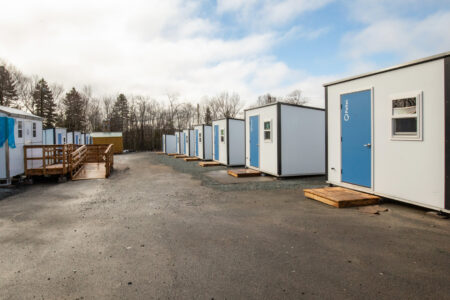
Only a fool would set out to forecast events for 2021 considering the unexpected year we’ve had. But we can still reflect on how the events of the past 12 months have set the stage for what comes next. Whatever happens in the next year will unfold within a specific context. Part of the context is the attitudes and expectations of Canadians.
One of the remarkable things about these attitudes and expectations is that, overall, they have not been upended by the arrival of COVID-19. Yes, some things changed. At the end of 2019, the environment had overtaken the economy as the public’s top preoccupation – for the first time since 2007. In 2020, however, the environment and the economy were both, not surprisingly, eclipsed in immediate importance by the pandemic. But beyond such obvious shifts, Canadians’ outlook was not shattered. The proportion of Canadians who feel hopeful about the future or who feel they can bounce back after hard times was no lower at the end of summer than it was at the start of the year, before the pandemic began spreading here. And if large majorities of Canadians supported calls for government action to improve care for seniors, or expand child care, or ensure workers can take sick days, this was not because of their experiences with COVID-19: most Canadians have supported such measures for years.
But change is happening nonetheless. Opinions in Canada on key issues are evolving, and in ways that go well beyond temporary blips caused by the COVID-19 crisis. These social changes will impact our politics one way or another in 2021 and beyond – whether the vaccines roll out quickly or not. What follows, then, are not predictions, but trends discerned from a series of public opinion studies undertaken by the Environics Institute over the past 12 months. These trends are already playing a role in shaping the country’s future.
1. The world is a less friendly place
When Canadians look at around the world, they see fewer friends and more enemies than before. Compared with 2013, only half as many Canadians in 2020 see China as a friend; almost five times as many see that country as an enemy. Only three-in-five Canadians now think the United States is our friend. That proportion could rebound with the inauguration of a new U.S. president, although the openness of Joe Biden’s administration to giving special consideration to Canadian interests remains to be seen. Canada has yet to come up with a foreign policy suitable for a multipolar world with rising tensions between major powers. A growing proportion of the public, however, appears to accept that a re-think is in order.
2. Declining confidence in business
Conventional wisdom insists that we are losing confidence in politicians. The reality is that confidence in political leaders in Canada cycles up and down. It hit a low point in the early 1990s, when the country experienced both an economic recession and a constitutional crisis, rose for much of the next two decades, and has ebbed down more recently. The more striking change is the drop in confidence in business leaders. Having held steady for more than 25 years, confidence in business leaders declined at the time of the last financial crisis in 2008 and has kept falling since. In 1992, business leaders had a 43-point edge in confidence over political leaders; in 2020, the margin has been reduced to only eight points. Will the actions of the business community in the coming economic recovery reinforce or reverse this trend?
3. Growing concern for those less well-off
The emergency income support programs adopted by governments in response to the pandemic drew attention to the notion of a basic income or guaranteed annual income policy, one designed to ensure that no Canadian falls below a minimally acceptable threshold of security. Two-in- three Canadians now support such a policy, up from fewer than one in two in 2013. Debates will continue to rage among policy experts about whether a guaranteed annual income is feasible or affordable. The survey results, however, should be read as an expression of support for the principle that everyone in Canada should have enough to pay for basic necessities. Governments have a variety to tools to choose from to meet the public’s growing concern for protecting the most vulnerable in our society.
4. Canada has a racism problem
The anti-racism protests that erupted in the United States, Canada and worldwide in the spring of 2020 sparked a significant re-think of the issue among Canadians. The proportion who say discrimination against Black people is no longer a problem in Canada fell by more than half, from 47 per cent in the spring of 2019 to 20 per cent in the fall of 2020. Similarly, in the case of discrimination against Chinese people, half as many today compared with 2019 say that it is no longer a problem (falling from 63 per cent to 31 per cent). It is reasonable to attribute much of this change to the focus on anti-Black and anti-Indigenous racism following the killing of George Floyd in the United States. The parallel shift in view in the case of Chinese-Canadians, however, may also be a reaction to a number of incidents of abusive behaviour against people of Chinese origin in the wake of the eruption of the COVID-19 pandemic. The end result is a public much more aware of the reality of racism in Canada and the need for change.
5. The slow progress toward reconciliation
Before the pandemic, the news in Canada was dominated by the issue of Indigenous rights, as plans to complete construction of a natural gas pipeline through the traditional territories of the Wet’suwet’en Nation triggered protests across the country, including the blockades of railway lines. Conflict over Indigenous rights and access to natural resources resurfaced later in the year, this time on the East Coast in relation to the lobster fishery. Public opinion did shift somewhat in the context of these events, in the direction of greater support for Indigenous Peoples. The proportion of Canadians who say that governments have not gone far enough to advance reconciliation with Indigenous Peoples increased modestly over the course of 2020, while there was a slight drop in the proportion saying governments have gone too far. Indigenous Peoples may not be alone in their frustration in the slowness of the progress toward reconciliation.
6. Immigration and the economic recovery
Over the course of 2020, millions of Canadians either lost their jobs or had their hours of work reduced as a result of the economic shutdown. In the face of that, more Canadians than ever before rejected the premise that immigrants take jobs away from other Canadians. For roughly two decades, Canadians’ views of immigration have been growing increasingly favourable. The pandemic did not stall this trend; it accentuated it. The eventual economic recovery will be supported by a range of policies, but the public expects that a continued emphasis on immigration will be one of them.
7. Generational change in Quebec
Quebec’s political leaders like to speak of a consensus in that province on the issue of secularism, or laïcité, but this is far from the case. It is true that a majority (though not all) of francophone Quebecers support restrictions on the wearing of religious symbols by public servants, while a majority (though not all) of Canadians outside of Quebec do not. But within Quebec, views vary significantly among age groups: while 65 per cent of francophone Quebecers age 55 or older favour a form of religious neutrality that restricts the wearing of religious symbols, only 37 per cent of their counterparts under the age of 40 concur. And that means that there is relatively little difference in view between millennials inside and outside of the province. The net result is that any reference to a consensus within Quebec obscures the significant difference in perspective between the generations that came of age in the wake of the Quiet Revolution.
8. The “de-alienation” of B.C.
In early 2020, the notion of “Wexit” was offered as a response to the re-election a few months earlier of the federal Liberals without a single seat in Saskatchewan and Alberta. It is true that in Alberta, feelings of regional alienation had been on the rise, certainly in 2019 (though waning slightly in 2020). The bigger shift in the West, however, is not heightened alienation in Alberta, but its remarkable drop-off in British Columbia. For almost 20 years, the proportion of British Columbians feeling their province was not respected in Canada has steadily declined. This marks the warming of relations in the federation.
9. What divides us on climate change and energy
Most Canadians favour action to address climate change, but that doesn’t mean there is a consensus as to what that action should be. Not surprisingly, surveys show there are a significant number of Canadians concerned we are moving either too slowly or too quickly. At the same time, the country is much less regionally divided on the issue than is often assumed. Asked whether the environment should take precedence over the economy, agreement in Ontario and Alberta hovers on either side of the 50-per-cent mark. And in Alberta itself, the population is evenly divided. Our regionalized politics tends to pit provinces against one another or against Ottawa, but on this question, Canadians in every part of the country are struggling to find common ground.
10. Federalism: show it some love
We are used to singling out the federation’s malcontents. Some Quebecers want to separate; some Westerners are alienated. But this finger-pointing approach misses the more troubling fact that over time, everyone’s views on the advantages of federalism have soured. Fewer than one-in-two Canadians now agrees that federalism has more advantages than disadvantages for their province. And the decline in agreement has occurred in every region of the country. A swift response to the pandemic, tailored to the needs of each region with each level of government playing its part, provided an opportunity to reverse this trend. In practice, the persistence of the pandemic’s second wave may have only reinforced it.
Photo: Bay Street in Toronto. Shutterstock.com, by eskystudio.









